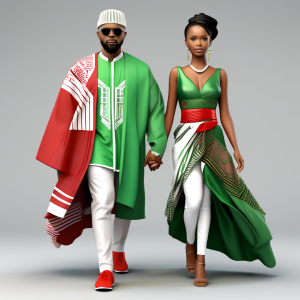Dive into the vibrant world of Nigerian fashion, where creativity and  craftsmanship converge. Explore the unique and diverse styles of both male and female fashion, proudly made in Nigeria. Discover the rich cultural heritage and modern influences that shape Nigerian fashion trends.
craftsmanship converge. Explore the unique and diverse styles of both male and female fashion, proudly made in Nigeria. Discover the rich cultural heritage and modern influences that shape Nigerian fashion trends.
Introduction:
Nigeria, known for its rich cultural heritage and artistic traditions, has emerged as a vibrant hub of fashion and style. The Nigerian fashion industry has gained global recognition for its creativity, craftsmanship, and unique blend of traditional and contemporary elements. In this article, we will delve into the captivating world of Nigerian fashion, specifically focusing on the diverse and captivating styles available for both men and women.
Male Fashion in Nigeria:
Nigerian male fashion showcases a perfect blend of tradition and modernity. Traditional attire such as the agbada, babariga, and danshiki have been reimagined with contemporary twists, making them suitable for various occasions. These outfits are often made from high-quality fabrics like aso-oke, ankara, and adire, which are rich in color and pattern.
For formal occasions, Nigerian men often opt for the classic “senator” style, characterized by a well-tailored shirt paired with matching trousers and a distinctive cap. This ensemble exudes elegance and sophistication. In more casual settings, men can be seen sporting stylish kaftans, embellished with intricate embroidery or hand-painted designs.
Nigerian male fashion also embraces Western influences, with men incorporating tailored suits, blazers, and trousers into their wardrobes. This fusion of traditional and contemporary styles creates a unique and personalized fashion statement.
Female Fashion in Nigeria:
Nigerian female fashion is renowned for its boldness, vibrancy, and attention to detail. The use of colorful fabrics, intricate patterns, and embellishments sets Nigerian women’s fashion apart. The popular fabric choices include ankara, lace, george, and aso-oke, which offer endless possibilities for creativity and self-expression.
Traditional Nigerian attire for women includes the iro and buba, gele headwraps, and the iconic wrapper and blouse ensemble. These outfits are often adorned with handcrafted beads, sequins, and embroidery, showcasing the craftsmanship and artistry of Nigerian designers.
In recent years, Nigerian women have embraced contemporary styles such as peplum tops, bodycon dresses, and jumpsuits. These modern designs fuse Nigerian cultural elements with global fashion trends, creating a unique and fashion-forward look.
Promoting Made in Nigeria Fashion:
The Nigerian fashion industry is not just about style; it also plays a significant role in promoting local craftsmanship and supporting the economy. Nigerian designers are increasingly gaining recognition on the global stage, showcasing their collections at international fashion shows and collaborating with renowned fashion houses.
The “Made in Nigeria” movement encourages Nigerians to embrace and support local fashion brands and artisans. By purchasing Nigerian-made clothing, individuals contribute to job creation, skills development, and the preservation of cultural heritage. Additionally, wearing Nigerian fashion allows individuals to express their identity and pride in their country’s rich cultural tapestry.
Conclusion:
Nigerian fashion captures the essence of creativity, cultural heritage, and self-expression. The male and female fashion styles made in Nigeria showcase a harmonious fusion of tradition and modernity. From vibrant colors and intricate patterns to exquisite craftsmanship and attention to detail, Nigerian fashion is a celebration of individuality and cultural diversity.
As the Nigerian fashion industry continues to evolve and gain global recognition, it serves as a testament to the talent and creativity of Nigerian designers. By embracing and promoting Nigerian-made fashion, we not only support local artisans and the economy but also celebrate the unique beauty and cultural heritage of Nigeria. Let us continue to appreciate and showcase the beauty of Nigerian fashion to the world.

I like this blog it’s a master piece! Glad I noticed this
on google.!